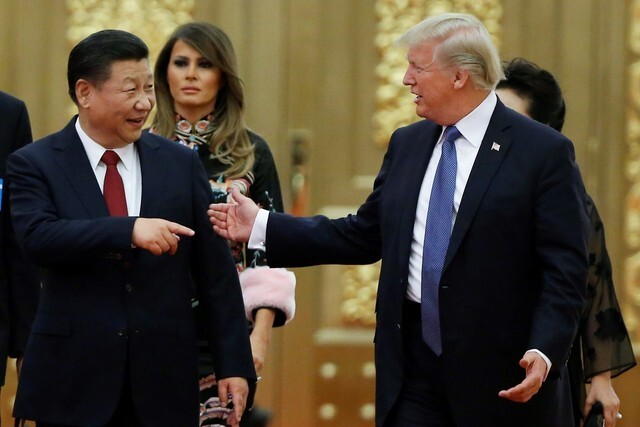hankyoreh
Links to other country sites 다른 나라 사이트 링크
Press announcement hints at US openness to dialogue on North Korean nuclear issue

A White House press announcement a day and a half after US President Donald Trump and Chinese President Xi Jinping’s Nov. 9 summit in Beijing mentioned efforts to resolve the Korean Peninsula nuclear issue through dialogue. The message’s inclusion is seen as signaling that the two sides reached something of an agreement at their summit on the need for dialogue with Pyongyang to achieve a breakthrough.
The press announcement sent to reporters on the evening of Nov. 10 said that China and the US would “work toward resolving the Korean Peninsula nuclear issue through dialogue and to addressing the reasonable concerns of all parties.” The message has not been included before in past US press reports on the US-Japan summit outcome or in joint press releases following the South Korea-US summit.
Its inclusion has some speculating that the Trump administration, which has been focusing on “maximum pressure” in response to North Korea’s nuclear and ballistic missile testing, may have begun seeking an exit strategy as well. Also unusual was the reference to the “Korean Peninsula nuclear issue” rather than the “North Korean nuclear issue.” The “reasonable concerns of all parties” appears to refer to Washington’s recent hints at possible military action against the North, and could be seen as signaling that it plans to avoid similar messages going ahead.
The same announcement said South Korea and the US had “recognized that North Korea’s nuclear and ballistic missile tests violate relevant U.N. Security Council resolutions, and affirmed a commitment to keep up pressure to curb these [nuclear and missile] programs, including through full and strict implementation of relevant U.N. Security Council resolutions.” The message suggests the administration will continue imposing sanctions and applying pressure while seeking dialogue with Pyongyang. In a Twitter message on Nov. 12, Trump wrote, “President Xi of China has stated that he is upping the sanctions against #NoKo. Said he wants them to denuclearize. Progress is being made.”
US Secretary of State Rex Tillerson was quoted by Bloomberg as sending a similar message while speaking to reporters on Nov. 10 while traveling from Beijing to Danang. “Eventually we’re going to have one of those days where we’re both going to say OK, maybe it’s a good time to have that first conversation,” he said.
Tillerson qualified the remarks, saying it would be “not to start negotiations but to have that conversation.” But with exploratory dialogue and unofficial “conversations” serving as the early procedure ahead of official negotiations that are particularly politically troublesome, the message could be seen as showing the process has more or less begun.
Tillerson also implied that he was waiting for a signal from North Korea’s supreme leadership for the conversation to begin between the two sides, explaining that there needed to be “an indication from Kim Jong Un himself that they would like to have some type of a meeting.”
Speaking on condition of anonymity, a diplomatic source in Washington, D.C. said Pyongyang was “apparently insisting to the US government that the issue of lifting sanctions needs to be part of the ‘conversation’” – suggesting some pushing and pulling continues behind the scenes.
Meanwhile, Trump tweeted a complaint about Kim’s rhetoric on Nov. 12.
“Why would Kim Jong-un insult me by calling me ‘old,’ when I would NEVER call him ‘short and fat?’” he wrote.
The message appeared to be in response to a North Korean Foreign Ministry spokesperson’s statement on Trump’s address to the National Assembly, which was referred to the “ridiculous remarks of an old lunatic like Trump.”
“Oh well, I try so hard to be his friend,” Trump continued in a resigned tone. “And maybe someday that will happen!”
By Yi Yong-in, Washington correspondent
Please direct questions or comments to [english@hani.co.kr]

Editorial・opinion
![[Column] Season 2 of special prosecutor probe may be coming to Korea soon [Column] Season 2 of special prosecutor probe may be coming to Korea soon](https://flexible.img.hani.co.kr/flexible/normal/500/300/imgdb/original/2024/0426/3317141030699447.jpg) [Column] Season 2 of special prosecutor probe may be coming to Korea soon
[Column] Season 2 of special prosecutor probe may be coming to Korea soon![[Column] Park Geun-hye déjà vu in Yoon Suk-yeol [Column] Park Geun-hye déjà vu in Yoon Suk-yeol](https://flexible.img.hani.co.kr/flexible/normal/500/300/imgdb/original/2024/0424/651713945113788.jpg) [Column] Park Geun-hye déjà vu in Yoon Suk-yeol
[Column] Park Geun-hye déjà vu in Yoon Suk-yeol- [Editorial] New weight of N. Korea’s nuclear threats makes dialogue all the more urgent
- [Guest essay] The real reason Korea’s new right wants to dub Rhee a founding father
- [Column] ‘Choson’: Is it time we start referring to N. Korea in its own terms?
- [Editorial] Japan’s rewriting of history with Korea has gone too far
- [Column] The president’s questionable capacity for dialogue
- [Column] Are chaebol firms just pizza pies for families to divvy up as they please?
- [Column] Has Korea, too, crossed the Rubicon on China?
- [Correspondent’s column] In Japan’s alliance with US, echoes of its past alliances with UK
Most viewed articles
- 1‘We must say no’: Seoul defense chief on Korean, USFK involvement in hypothetical Taiwan crisis
- 2AI is catching up with humans at a ‘shocking’ rate
- 3[Column] Season 2 of special prosecutor probe may be coming to Korea soon
- 4Division commander ordered troops to enter raging flood waters before Marine died, survivor says
- 5Is Japan about to snatch control of Line messenger from Korea’s Naver?
- 6The dream K-drama boyfriend stealing hearts and screens in Japan
- 7Korea protests Japanese PM’s offering at war-linked Yasukuni Shrine
- 8“Korea is so screwed!”: The statistic making foreign scholars’ heads spin
- 9‘Weddingflation’ breaks the bank for Korean couples-to-be
- 10Korea sees more deaths than births for 52nd consecutive month in February